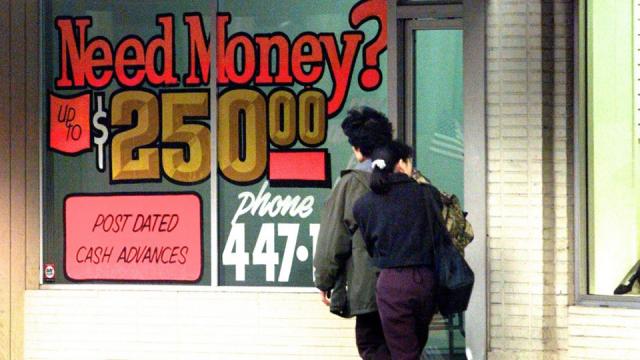
A trail of money that began with triple-digit loans to troubled New Yorkers and wound through companies owned by a former used-car salesman in Tennessee led New York prosecutors on a yearlong hunt through the shadowy world of payday lending.
On Monday, that investigation culminated with state prosecutors in Manhattan bringing criminal charges against a dozen companies and their owner, Carey Vaughn Brown, accusing them of enabling payday loans that flouted the state’s limits on interest rates in loans to New Yorkers.
Such charges are rare. The case is a harbinger of others that may be brought to rein in payday lenders that offer quick cash, backed by borrowers’ paychecks, to people desperate for money, according to several people with knowledge of the investigations.
“The exploitative practices — including exorbitant interest rates and automatic payments from borrowers’ bank accounts, as charged in the indictment — are sadly typical of this industry as a whole,” Cyrus R. Vance Jr., the Manhattan district attorney, said on Monday.
In the indictment, prosecutors outline how Mr. Brown assembled “a payday syndicate” that controlled every facet of the loan process — from extending the loans to processing payments to collecting from borrowers behind on their bills. The authorities argue that Mr. Brown, along with Ronald Beaver, who was the chief operating officer for several companies within the syndicate, and Joanna Temple, who provided legal advice, “carefully crafted their corporate entities to obscure ownership and secure increasing profits.”
Beneath the dizzying corporate structure, prosecutors said, was a simple goal: make expensive loans even in states that outlawed them. To do that, Mr. Brown incorporated the online payday lending arm, MyCashNow.com, in the West Indies, a tactic that prosecutors say was intended to try to put the company beyond the reach of American authorities.
Other subsidiaries, owned by Mr. Brown, were incorporated in states like Nevada, which were chosen for their light regulatory touch and modest corporate record-keeping requirements, prosecutors said.
Each company — there were 12 in all — further distanced Mr. Brown and his associates in Chattanooga, Tenn., from the lending, prosecutors said. On Monday, the three executives. whom prosecutors accused of orchestrating a “systemic and pervasive usury scheme,” were charged with violating usury rates and a count of conspiracy.
Mr. Brown’s lawyer, Paul Shechtman with Zuckerman Spaeder, said his client “acted in good faith and looks forward to showing his innocence.”
On Monday, Mr. Beaver, who was arraigned in state court, entered a plea of not guilty. Denis Patrick Kelleher of the law firm Clayman & Rosenberg said his client “voluntarily appeared in court this morning to defend himself against these charges,” adding that “we expect he will be fully vindicated.”
Priya Chaudhry, a lawyer with Harris, O’Brien, St. Laurent & Chaudhry who represents Ms. Temple, said she was confident in her client. She added that “it remains to be seen whether the advice Ms. Temple gave was incorrect or in violation of any laws.”
The indictment offers a detailed look at the mechanics of the multibillion-dollar payday loan industry, which offers short-term loans with interest rates that can soar beyond 500 percent. Following the threads of the operations took months, according to several lawyers briefed on the investigation. Prosecutors pored over reams of bank records and internal company documents to determine how the disparate companies were connected.
The payday lending operation began when borrowers applied for loans on websites like MyCashNow.com. From there, borrowers’ information was passed to another company, owned by Mr. Brown, that originated the loans. The information then wound up with another company, owned by Mr. Brown, that collected payments from borrowers. To construct the web, prosecutors say, Mr. Brown turned to his lawyer, Ms. Temple, who is accused of offering “false advice.”
The case also shows the lengths that some lenders, scattering their operations across the country, will go to avoid interest rate caps that 15 states have adopted. In New York, where usury laws cap loans at 25 percent, lenders illegally dole out millions of dollars of loans at much higher rates.
Interest rates on loans tied to Mr. Brown’s companies, for example, hovered between 350 and 650 percent, prosecutors say. While prosecutors do not know just how much was lent to New Yorkers, one company in Mr. Brown’s syndicate reported that in 2012 it received about $50 million in proceeds from loans made to New York residents.
To choke off that flow of cash, New York authorities have taken aim at lenders, and the banks that enable them to do business. Last August, for example, Benjamin M. Lawsky, the state’s financial regulator, sent letters to 35 online lenders, telling them to “cease and desist” from making loans that violate state usury laws.
His office also took aim at the banks that give the lenders crucial access to borrowers, enabling them to automatically withdraw monthly loan payments from borrowers’ checking accounts.
The scrutiny hit close to home in March 2012, prosecutors said, when Eric T. Schneiderman, the New York attorney general, sent a letter to one of Mr. Brown’s companies and to Ms. Temple, reiterating that New York’s usury law applied, even if the lenders operated outside New York.
While the attention unnerved executives at the “payday syndicate,” it did not damp their lending, prosecutors said, because New York was just too profitable to abandon. New York, according to internal company documents, ranked as the third-most-profitable state for the loan companies.
To stay below law enforcement’s radar, prosecutors said, the companies sometimes stopped trying to collect money from certain borrowers in New York. The idea, prosecutors said, was to minimize the onslaught of complaints from New York residents, which were detailed in a chart circulated throughout the company.
In one email authorizing an end to collection from one borrower, Ms. Temple said there was “no need to tweak anyone’s nose.”
3 WAYS TO SHOW YOUR SUPPORT
- Log in to post comments











